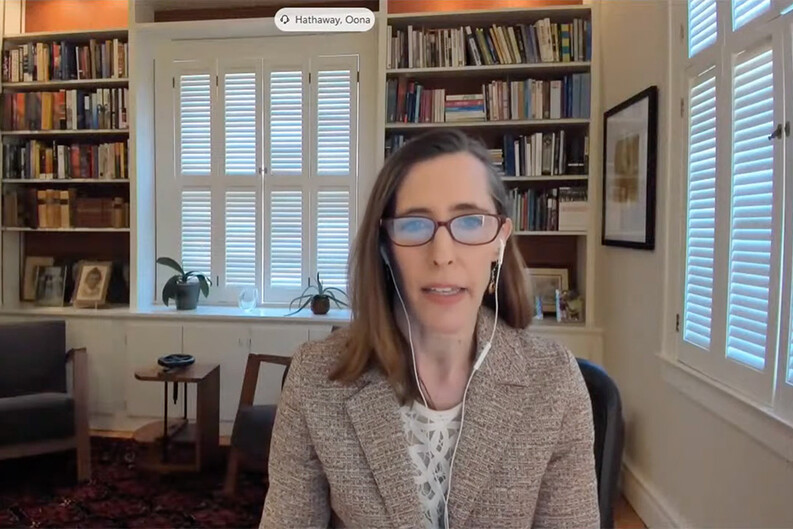Professor Hathaway Testifies Before House Committee on Foreign Affairs

Professor Oona A. Hathaway ’97 testified during a virtual hearing before the U.S. House of Representatives Committee on Foreign Affairs on March 23, 2021. The hearing, titled “Reclaiming Congressional War Powers,” addressed issues concerning the balance of war powers between the executive and legislative branches, with a particular focus on authorizations for the use of military force (AUMFs) and the 1973 War Powers Resolution.
The first issue was whether Congress should repeal the Authorization for Use of Military Force Against Iraq Resolution of 2002 (2002 AUMF), enacted in the run-up to the 2003 war in Iraq. Earlier authorizations were also mentioned, including a 1991 authorization for the Gulf War and a 1957 authorization under President Eisenhower to fight communism in the Middle East, both of which remain on the books.
The second issue concerned whether the 2001 AUMF enacted shortly after the September 11, 2001 attacks should be repealed and replaced — and if replaced, with what. Third, the hearing addressed whether Congress should reform the 1973 War Powers Resolution, which many think is outdated and ineffectual, according to Hathaway.
“The hearings signal a growing interest in Congress in revising the authorities for use of military force and reclaiming a role for Congress in decisions about when and whether to use military force,” Hathaway said.
Watch the hearing (Hathaway begins at the 32:19 mark)
In her written testimony, Hathaway addressed the 1991 and 2002 AUMFs: “These authorizations were enacted by past Congresses for purposes that have long since been achieved…Leaving the 1991 and 2002 AUMFs on the books simply leaves the door open to their misuse without giving [p]residents any additional legitimate basis for military action.”
Hathaway also testified regarding alleged misuse of the 2002 AUMF, citing members of the Trump administration referencing the 2002 AUMF as authority for the deadly strike on Qasem Soleimani. She explained that the agreement among most experts is that the 2002 AUMF did not authorize said operation, as the authority granted in the 2002 AUMF was limited.
The committee hearing, Hathaway said, “is a prelude to a discussion of proposed legislation to repeal the 2002 AUMF as a stand-alone piece of legislation, and that issue was one on which members had a number of questions.”
The 2001 AUMF, enacted only days after September 11, 2001 “was necessarily vague because the government was not yet entirely confident as to the group or groups responsible for the attack,” Hathaway said. She suggested that if the 2001 AUMF is replaced, it should contain a reauthorization requirement, define who the enemy is, and have clear and specific reporting requirements to Congress.
Lastly, Hathaway discussed war powers reform, specifically pertaining to the War Powers Resolution. She suggested that “hostilities” be defined, the Resolution be enforced through Congress’ ability to terminate funding for operations, and that there be a manner for Congress to challenge Executive Branch interpretations of the Resolution in court. Addressing the ability bring a challenge in court, Hathaway stated that “previous efforts to seek judicial review by members of Congress have been dismissed on both standing and political question grounds.” However, Hathaway said that she believes based on recent judicial precedent, a provision appointing representatives to bring any claims on behalf of one or both Houses of Congress “could help overcome the justiciability barriers that have impeded judicial review in the past.”
Additional hearing testimony was given by NYU School of Law Professor of Practice and Distinguished Scholar in Residence Bob Bauer, and Jack Goldsmith ’89, Learned Hand Professor of Law at Harvard Law School.
Hathaway is the Gerard C. and Bernice Latrobe Smith Professor of International Law at Yale Law School, Professor of International Law and Area Studies at the Yale University MacMillan Center, Professor of the Yale University Department of Political Science, and Director of the Yale Law School Center for Global Legal Challenges.


